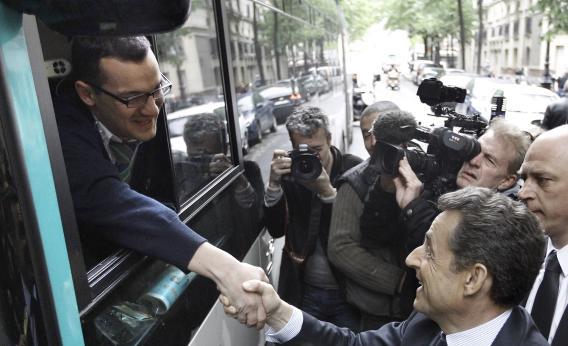PARIS—Barack Obama, onetime darling of the international left, has become just another American president. That was the impression you got as the Socialist Party unveiled a “history of the left” film to play before speeches by its presidential candidate, François Hollande. The film featured only one contemporary foreign leader: Brazil’s Lula da Silva, not Obama. Meanwhile, it was Nicolas Sarkozy who—in an opportunistic breach of typical president-to-president protocol — invited media to take pictures of him in a teleconference with the White House. The move was widely mocked in France, just the latest episode of Sarkozy clutching desperately at Obama’s coattails.
But just because he is no longer a transcendent figure in French politics doesn’t mean Obama should tune out this election. Elections in the United States and France have enough in common—an information-rich, multiyear process centered very much around personalities—that the White House should be paying attention to what’s just happened in France and what will happen before the second round on May 6. Here are five takeaways for Obama.
1) Life is hard for incumbents. Europe is littered with the remains of once formidable leaders who didn’t survive the political consequences of the financial crisis. Gordon Brown, José Luis Zapatero, and Silvio Berlusconi are among those chased from office—and Nicolas Sarkozy is poised to join them. Last night he became the first sitting French president not to lead in the first round of voting, and all polls show him lagging François Hollande in second-round matchups.
2) The energy is at the margins. Five years ago, the challenge to France’s left-right duopoly came from the center. The third-place finisher in 2007’s second round was a late-surging François Bayrou, a cautious centrist who balanced his jabs at Sarkozy and Socialist opponent Ségolène Royal. This year Bayrou fell embarrassingly into fifth place, and the two candidates who stand between him and the two front-runners are both offering a much bolder critique of the status quo.
Marine Le Pen won about 18 percent of the votes, the most her far-right Front National party has carried since her father Jean-Marie first ran in 1974. (Even when he qualified for the second round, in 2002, he did so with less than 17 percent.) Jean-Luc Mélenchon, whose Left Front unapologetically embraces the heritage of France’s Communist Party, finished fourth, with just over 10 percent. Mélenchon’s emergence as a force in the race helped push the usually moderate Hollande to embrace sharp anti-finance rhetoric and propose a top tax rate of 75 percent.
The cautionary tale for both Obama and Romney: If there’s an appetite for third-party politics this year, it might not be coming from Americans Elect but from the Tea Party and the Occupy Wall Street movement.
3) Claiming It’s getting better doesn’t make things much better.
The best line at a Hollande rally in the last week of the campaign didn’t come from the candidate himself but from a former rival who is likely to become prime minister in his government. Martine Aubry mocked Sarkozy’s reaction to an employment report that he claimed showed the economy was “getting better” despite the fact that it reported that 20,000 French were newly jobless. “To escape his electoral predicament, Nicolas Sarkozy has tried to start up the promises factory,” Aubry quipped in Lille, her hometown. “You know the promises factory? One of the few factories that hasn’t closed under Mr. Sarkozy.”
The U.S. election will likely play out over six months of halting and uncertain economic recovery that doesn’t lend itself to strong rhetoric on either side. Obama will be wary of prematurely claiming success in a way that makes him look oblivious, while Romney will have difficulty alleging a complete disaster.
4) Foreign policy might not be a winner.
Playing the foreign-policy card is the last refuge of the weakened incumbent. Sarkozy has decided that for the sake of his re-election everything must be in crisis. Only on issues of national security can Sarkozy successfully raise the stakes for abandoning an incumbent. And so he has begun his rallies with a video showing him tending to the unique challenges of the presidency: a stream of images in full head-of-state mode, navigating crises from the Ivory Coast and Libya to meeting with Gilad Shalit.
But he rarely stays on the subject. Sarkozy strays back to other conservative themes — work, responsibility, authority — in part because it’s pretty evident that it is unlikely to displace economic concerns as a voter priority. A dead Bin Laden may be a stronger card for Obama than having welcomed home Ingrid Betancourt, but voters won’t make it easy to change the subject.
5) But maybe you can use strength to disqualify your opponent.
Even though Sarkozy is widely disliked among French voters, polls repeatedly show they see him—and not Hollande—as the stronger leader. There’s a path here to disqualifying an opponent even if voters agree with him on issues. In 1972, George McGovern lost to Richard Nixon even among those voters who thought that the United States should withdraw immediately from Vietnam and those who thought the military budget should be drastically reduced. By the end of the campaign, McGovern came to be seen as so weak a leader that voters who agreed with the Democrat on his signature issues didn’t think he would be able to accomplish anything on them.
Sarkozy’s pollsters think there may yet be a way to use his credibility as a leader to gain such an edge on Hollande: Show the Socialist to be so feeble that anyone who likes what he says about financial reform or new taxes would still wonder if he could possibly enact any of it. That could give hope to Obama’s efforts to depict Romney as a shape-shifter; it doesn’t matter if they think he’s better on the economy if they think he lacks the chops or fortitude to get anything done as president.
